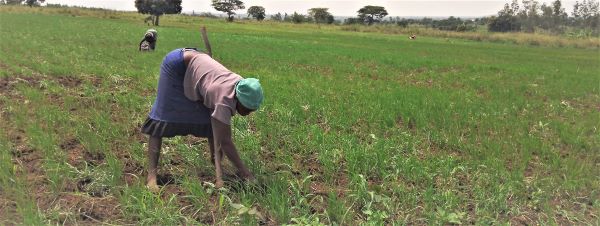NEBBI, December 18, 2024 — In a bid to combat the effects of climate change, government has decided to install a weather forecasting station in Nebbi district to provide farmers with real-time weather data, helping them make informed decisions about their agricultural activities.
According to the team from the Ministry of Water and Environment, the weather station will particularly assist farmers in the district in understanding local climate characteristics and selecting crops that are better suited to the area’s climate.
The weather station to be installed in the district is part of a project being implemented by the Ministry of Agriculture, Animal Industry and Fisheries [MAAIF], funded by the World Bank in partnership with the Ministry of Water and Environment, under the Uganda Climate Smart Agricultural Transformation Project [UCSATP]. This transformative initiative aims to integrate climate-smart agricultural practices.
James Bataze, a senior meteorologist at the Ministry of Water and Environment, said that Nebbi is one of 69 districts in Uganda where weather forecasting stations will be installed for purposes of helping farmers make informed decisions.
“The Ministry of Agriculture is procuring supercomputers that will be used to process, analyse, and generate agri-climate information, which will assist farmers in making informed farming decisions,” Bataze said.
He added that the ministry would also install rain gauges in various sub-counties across the district to monitor rainfall patterns and provide timely weather updates.
Joyce Piwa, Agricultural Officer for Nebbi District, said the weather station would provide data to improve post-harvest handling.
“As we continue to face the devastating effects of climate change on food production, weather forecasting must be a priority if we are to implement climate-smart agriculture. Farmers can no longer rely on assumptions about the weather,” she said.
The LC III Chairperson of Thatha Division in Nebbi Municipality claimed that the lack of weather stations in the district had led some farmers to stop farming, contributing to food insecurity in the communities.
The Production Officer for Nebbi District, Laverus Nyakuni, said the district used to have two planting seasons, but due to climate change, it now only has one.
“In the early 90s, we would receive the first rains around 15 February, and that’s when farmers would plant their crops. But now, if you plant your crops in the first season, you can hardly harvest due to the effects of climate change. Farmers need to be informed and updated about these changes,” he said.
He added that farmers in the district would benefit from the weather forecasting station, as it would provide all the necessary information regarding planting seasons and harvest periods.
Summary of how weather stations can help farmers
Plan planting and harvesting
Farmers can use weather stations to determine the best times to plant and harvest crops. For example, farmers can delay planting to avoid drought damage if temperatures are expected to be high.
Optimise irrigation
Weather stations can help farmers monitor soil moisture and determine when to irrigate. This can help farmers save water resources.
Protect crops
Weather stations can help farmers predict weather changes and take steps to protect their crops from weather hazards like drought and flooding.
Choose crops
Weather stations can help farmers understand local climate characteristics and select crops that are well-suited to the local climate.
Reduce environmental impact
Weather stations can help farmers make data-based decisions that reduce environmental impacts.
Improve production efficiency
Weather stations can help farmers improve the efficiency of their farming activities.
Weather stations can also provide early warning of meteorological disasters, such as droughts, floods, and frosts.
Mobile services, such as text messaging, interactive voice response, and interactive messaging services, can also provide farmers with weather forecasts and farm advisories.
https://thecooperator.news/climate-smart-agricultural-programme-launched-in-west-nile/
Buy your copy of thecooperator magazine from one of our country- wide vending points or an e-copy on emag.thecooperator.news
